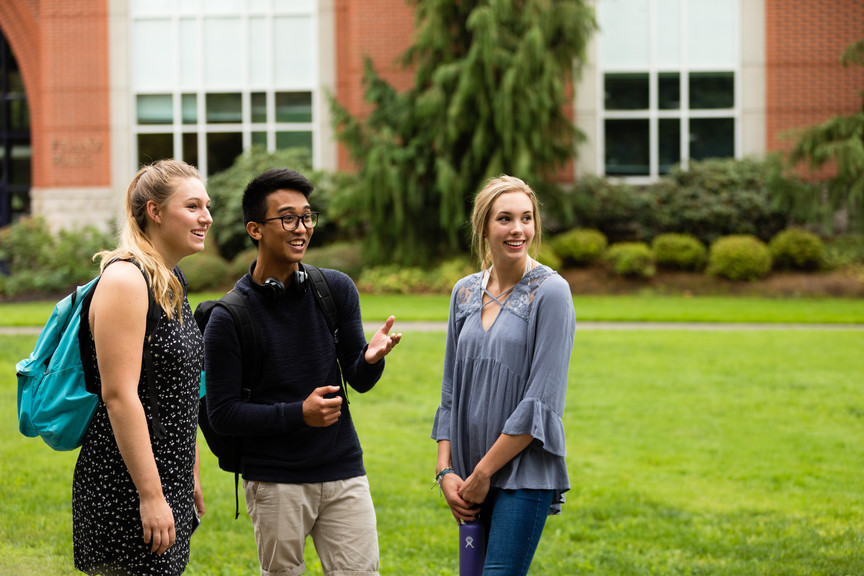First Year Focus
At the beginning of fall semester, many first-year students did not realize they had to spend so much of their “free” time reading, studying, and preparing for classes. By mid-term, most had learned they must spend at least two hours of preparation for every hour of class if they want to earn an average grade of a “B” (3 hours for an “A”). Unfortunately, for some, their delayed realization caused a slump in their grades. However, the pep talks they received from you as parents must have sunk in. A good number of first-year students have returned to their coursework this semester with renewed motivation and are now eager to start their spring semester strong. Last semester, many hours were spent discussing time management concerns, while this semester many students have time management plans already formulated. Parents – please keep up the positive reinforcement!
Several students have shared that they like their classes better this semester. Their reasons given included having a chance to review the course schedule, selecting their own courses, and knowing why they are required to take certain courses. This positive attitude and renewed vigor should aid their academic performance. Students that performed below expectations early in the school year do, in most cases, raise their grades over the spring semester. However, as many share with their academic advisors, they hope their parents are not expecting miracles.
In addition to old anxieties such as grades, eating healthy, and finding time for everything (including sleep), spring semester may bring new anxieties. Students often worry about choosing an academic major, if their current major is the right one for them, or if they should explore a double major or a minor. If your student moved to campus this semester (or even if they are still living at home), they are also probably concerned about meeting new people and may be dealing with the loss of the familiar routine.

Choosing a Major
In April, first-year students will begin registering for next fall’s classes. Below are a few suggestions for parents and students to consider.
- Students should understand that choosing a major is not choosing a career. Many students attending college now will have at least four to five careers throughout their lifetime. Students should find a major that interests them.
- We recommend that students make a virtual appointment with the Career Education Center. Interests change, and if so the Career Education Center can help give direction for next steps for students. The Career Education Center can also help explore internship options and help students develop networking and interviewing skills for summer jobs.
- First-year students can also look to upper-level students they admire and ask them about their major. Usually students with similar interests and personalities will also have similar academic interests.
- When your student has narrowed their choices to two or three majors, we suggest they make virtual appointments to meet with faculty members in those academic areas. Faculty members are happy to talk with students about their academic area and the career opportunities available.
Making Connections
As we discussed last month, no matter where your student is living this semester, they still have many opportunities to connect with peers! Students can create connection with peers by forming study groups, attending Mass or exploring their faith through Campus Ministry, engaging in critical human and environmental concerns through the Moreau Center for Service & Justice, participating in programming in their residence hall, or using the Engage platform to discover clubs, organizations, and upcoming events. The key is to develop connection and healthy coping skills now, so that when the stress of the semester kicks in your student will feel supported.

Dealing with Loss and Change
During the first year of college, many students experience separation from familiar things (especially if they are now living on campus), while sometimes simultaneously experiencing loss in their personal lives, such as the death of loved ones or divorce of their parents. The pandemic has certainly brought its own unique challenges, including change, loss, and fatigue.
Sometimes a combination of these factors can lead students to feel helpless. Unfortunately, many students facing these difficult circumstances do not seek counseling or help to manage these stressors. Many students feel they should be “adult enough” to handle these problems on their own. We hope that if any of these issues arise, you will encourage your student to seek comfort, listening, or other help from the University Health and Counseling Center, Campus Ministry, or Pastoral Care personnel. The University has many people trained to help students through these challenges.
The anxieties felt during the first year of college can be numerous, but there are so many staff members and resources available to support students through these challenges. Remember that your familial support and encouragement has a huge impact on boosting your student’s confidence and feeling of safety. We are so grateful for your partnership in the development and success of your student!
P.S. Midterms are coming up during the first half of March. We invite you to revisit the helpful tools and resources from the fall semester as you check in with your student. Please encourage them to seek academic support through the many resources available to them – they just need to ask for help!
